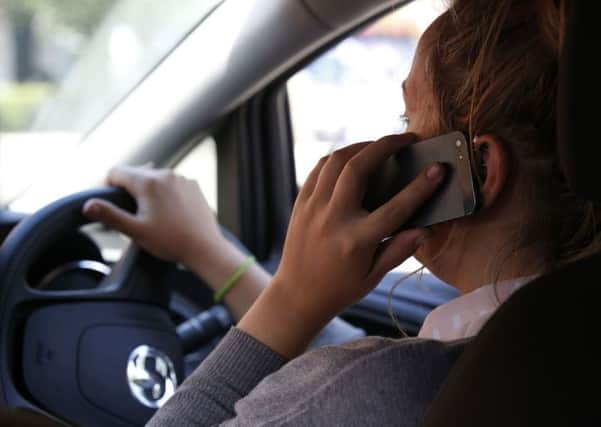AA welcomes crack down onusing mobiles while driving


Motorists who use handheld mobile phones while driving are to face increased penalties and higher fines under proposals from the Department for Transport.
As part of the government’s Road Safety Plan, to be published this week, the fixed penalty notice for dangerous mobile use will rise to £150 from £100, while persistent offenders will face having four penalty points imposed instead of three.
Advertisement
Hide AdAdvertisement
Hide AdThe proposals are targeted particularly at re offenders and most first-time offenders will be offered an educational course in an effort to improve their behaviour.
Offenders who are drivers of heavy goods vehicles, which can cause more severe accidents, will have their penalty points double from three to six.
In 2014, mobile phone usage was a contributing factor in 21 fatal road accidents and 84 serious accidents. The government will instigate a consultation on its proposals in the coming weeks.
AA Insurance hailed the proposals as ‘a victory for common sense’ and added that vehicle insurers already take the offence very seriously.
Advertisement
Hide AdAdvertisement
Hide AdA motorist convicted of a mobile phone offence can on average, expect to see a premium increase double that for a speeding offence.
Michael Lloyd, from AA Insurance, said: “Drivers using a handheld mobile phone are at four times greater risk of having a crash than a driver not using one and I am delighted that the penalty will now better reflect the seriousness of this offence.
“While drivers may mistakenly exceed a speed limit, no-one uses a handheld phone by mistake. It’s a deliberate act that seriously diverts attention from driving, significantly heightening the risk of a crash.”
He added that a few insurance companies might overlook a first speeding offence while most will ignore those who opt to take a safety awareness course instead of a fine . “But all insurers will penalise those who commit a mobile phone offence and some may even decline to renew cover.”
Advertisement
Hide AdAdvertisement
Hide AdAA research last year revealed that 23% of over 19,000 AA members admitted that they had: ‘been distracted, had a near miss or a crash over the previous 12 months’ while using or interacting in some way with mobile phone or other mobile device.
AA members also ranked hand held phone use, alongside tailgating, as the two most irritating and dangerous actions on the roads in an AA-Populus poll of 29,660 drivers.
Mr Lloyd said: “These are shocking admissions that underline the widespread use of and danger posed by hand-held phones. If a driver is texting, or calling, they aren’t concentrating and are taking their eyes off the road.
“No call or text can be more important than that.”
AA president Edmund King added: “This epidemic of hand held mobile phone use while driving has already cost lives and drivers have demanded action.
Advertisement
Hide AdAdvertisement
Hide Ad“Three quarters of drivers see others using mobile phones on some or most journeys, with one quarter seeing it on every journey, according to our polls .
“The majority of drivers will welcome these increased fines and penalty points, alongside driver improvement courses, to tackle those who use hand held mobiles at the wheel.”
The AA issued the following advice on using mobile phones.
Don’t use a mobile phone held in the hand while driving or while stopped with the engine switched on – it is illegal.
Stop to make or take a call or text message, or leave it to go to voicemail – even if you have a hands-free phone.
Advertisement
Hide AdAdvertisement
Hide AdIf you must talk and are using a hands-free phone, keep conversations short and simple or say that you will find a safe and legal place to stop and phone back.
If you call someone and think that they might be driving, ask them: Are you driving? Are you hands-free? Is it safe to talk?’.
If they are obviously driving and trying to continue the conversation it’s OK to say ‘I’ll call you back later’ or: ‘Call me when you have stopped’ and ring off .
Suzette Davenport, the National Police Chiefs’ Council lead for roads policing, said: “We fully support this crackdown on dangerous drivers.”